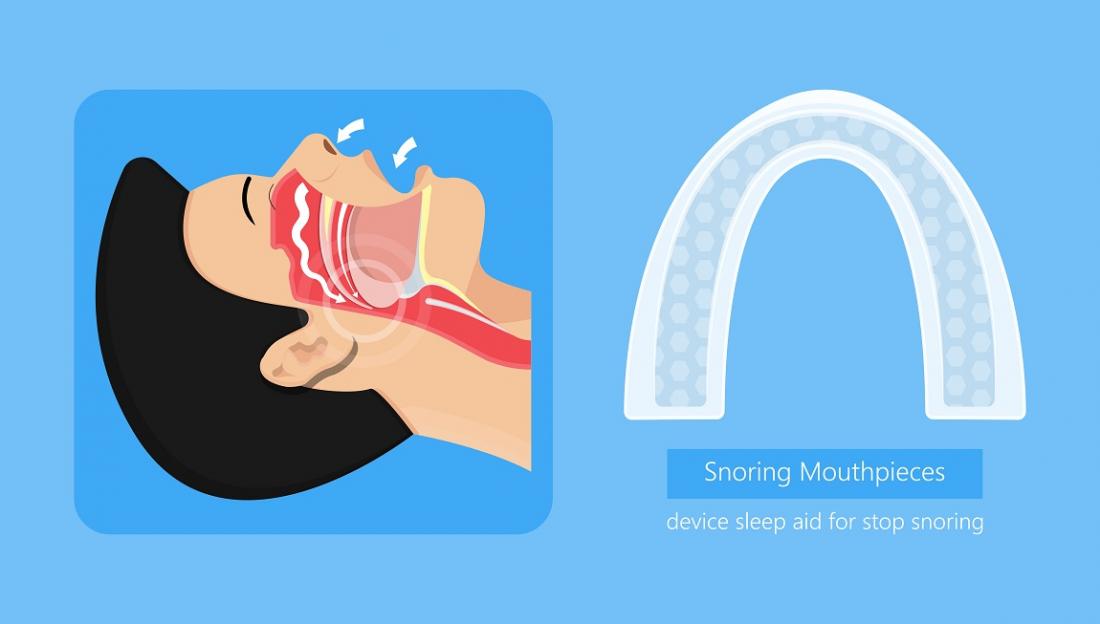
Could A Mouth Guard Be A Good Alternative To CPAP?
If you are one of many people who use a CPAP to treat obstructive sleep apnea, a condition that causes interrupted breathing during sleep and affects over 20 million Americans then you know that CPAP machines can be uncomfortable, cumbersome, and noisy. These are the reasons that many people discontinue the use of these devices and risk suffering the long-term consequences.
An oral appliance may be an easy-to-use alternative for many people with obstructive sleep apnea. Especially people with bed partners or folks who travel frequently. There is no hassle to bring along a mouth guard or worry that it will be broken in your luggage. Bed partners experience no disturbances due to the use of an oral appliance. Everyone sleeps better, not just the person with obstructive sleep apnea.
Loud snoring is just the tip of the iceberg. Serious underlying medical conditions and problems can develop as a result of leaving obstructive sleep apnea untreated. High blood pressure, diabetes, heart disease, liver problems are all potential long term health problems that untreated sleep apnea can cause.
The problem is a result of the soft tissue near the back of the tongue relaxing during sleep, falling back with gravity and obstructing the airway. This leads to a pause in breathing for brief and some surprisingly long periods of time. This can cause frequent awakening from gasping for air and ultimately regular daytime sleepiness, poor performance on the job, and car accidents.
Obstructive sleep apnea can vary from a mild condition that has very little negative effects to a severe and life-threatening condition that radically affects the quality of one's daily life. A sleep study is the only true way to assess and diagnose sleep apnea and it can also detect other sleep problems besides apnea, but there are home test kits that are easy to use and cost-effective. They test breathing effort and oxygen levels, but do not monitor brain waves or the sleep stages that a lab can record.
How do you know if you need a sleep assessment? There are several screening surveys that can assess your need for a sleep study. The Epworth and STOP-BANG surveys are among the most popular.
A CPAP — continuous positive airway pressure — machine is the most frequently recommended first line of treatment for sleep apnea. The device pushes air through a tube connected to a mask that covers the nose, mouth, or both. This forces the airway to remain open. Some machines can adjust the pressure for many different sleep positions, and they all have some apparatus for attaching and holding it on your head. This can be one of the biggest challenges working against the comfort of the person wearing it. Despite the adjustable straps it can still be challenging for many people to find a way to sleep with it on that doesn't disturb their sleep just as much as the sleep apnea does.
For these patients sleeping with a mouth guard may be less awkward or uncomfortable than a CPAP machine. These appliances are called mandibular advancement devices because that's precisely what they do. they prevent the jaw from falling backward and closing off the airway by holding it forward. You may have seen similar gadgets available over the counter, but in order to get the right fit and be sure it will work without damaging or stressing the temperomandubuluar joint a dentist should design and customize the appliance, as well as modifying or adjusting it when necessary. There is usually a period of about 4 to 6 weeks when adjustments need to be fine tuned to reach optimal effectiveness.
Tips for Better Sleep
Tired of waking up tired? You're not alone! Here are some facts that might surprise you about other people's hours in bed.
- 80% people say that they do not wake feeling rested even after a full nights sleep
- Yoga and meditation have proven to increase sleep quality when done before bedtime
- 2 out of 5 people report having more trouble sleeping than usual during the pandemic
There are still some people who don't have success with either a CPAP or a mandibular advancement appliance. As a last resort there are some effective surgical procedures.
The most common of these involves altering or removing tissue at the back of the tongue and throat. The surgeon can trim the structures and musculature of the mouth near the soft palate, uvula, and tonsils. They may reduce the size of these tissues with a heated instrument, correct a deviated septum, or change the position of the tongue , all for the purpose of increasing air flow.
There are also surgeries that move the jaw forward to make the entire breathing space larger, a procedure that can involve a protracted recovery period.
